#travel essay
Explore tagged Tumblr posts
Text
Death's Garden contributor: Greg Roensch
I met Greg Roensch when he was emceeing the Sponsors’ Open Mics at Borderlands Bookstore, back in 2016. Since then, I’ve followed his adventures with his guitar over social media. He was kind enough to write a beautiful meditation on his trip to Iceland for Death’s Garden Revisited. Officially, Greg Roensch writes short stories, makes poetry-films, and records original songs. He’s written two…
0 notes
Text


Now Reading:
Cynthia Zarin "Two Cities" (2020)
Photo Credit: karmaalwayswins
#cynthia zarin#venice#rome#travel essay#italy#now reading#not sure how to tag my own posts at this point
1 note
·
View note
Text
LINK FEST: 22 AUGUST 2023
Links that may or may not be related to gardens, food, travel, nature, or heterotopias and liminal spaces but probably are. Sources in parentheses. recipes: Corn, again? (Sarah Copeland/ EDIBLE LIVING). The White Risotto with Corn, Carrots and Kale is now on my to-make list. essay: How Athletic Beer Won Over America (Gabriella Paiella/GQ). Well we still don’t know the proprietary process that…

View On WordPress
#Ask vs guess gulture#asking for what you want#Athletic Beer#beer#Copenhagen#corn#food#license plates#link fest#linkfest#links#non-alcoholic beer#recipes#resilience#Sharon Salzberg#summer recipes#travel essay
0 notes
Text
Travel Essay Features

The main features of the travel essay are:
Artistic imagery.
Emotional richness.
Dynamism and adventurism.
The presence of elements of journalistic and artistic writing styles.
The author’s opinion.
The events and characters described in the essay are taken from real life.
The structure of a travel essay is similar to the structure of diary entries.
Urgency and relevance of the researched problem.
Slang, jargon words, or special terminology.
To confirm a personal point of view, the author uses facts, evidence, quotations, statistics, etc.
The most striking stylistic features of the travel essay are:
First of all, this is the expressed position of the author. All narrative is connected with the author’s opinion and view of the situation. Often, the author of the essay acts as a protagonist, interconnected with the main character.
Dialogue with the reader. Using various stylistic devices, the journalist seeks to arouse the reader’s interest and emotionally involve him in the plot of his essay, thus making the reader a participant in the described events.
1 note
·
View note
Text









Five billion octopath 2 scribbles i feel sick
#i know what you are wouldve made more sense w temenos i just really wNted to draw castti <\3 west continent crew my beloved#this isnt chronological at all. besides the first ones thats the first octopath i ever drew#like seconds after i finished castti and hikaris first chapter.#infected my brain so quickly i feel like a new person#i could write an essay on my octopath thoughts and rambling omfg.play octopath#art tag#octopath traveler 2#oh my god theyre all here ok#castti florenz#hikari ku#agnea bristarni#partitio yellowil#throné anguis#osvald v. vanstein#temenos mistral#ochette#dolcinaea luciel#veronica octopath#she didnt get a last name.SAD#i have more of these by the way.so many#ORIS HERE I GORGOT#ori octopath#i love ori. if i had to sacrifice myself but remembered how nice paritio was last minute i would also change my mind#oh ym god elenas here too#elena vanstien#shout out to you know how getting added to cotc im so happy.im scared if i say his name thisll show up in his tag and he isnt even here#he looks beautiful. and alive. awesome#the cotc artstyle is soooo pretty i saw castti and felt emotional#anyway. ot2. this is where ive been the past few months.#oh castti can inquire people. i know what you are does make sense for her heh
552 notes
·
View notes
Text
Tired Ghost
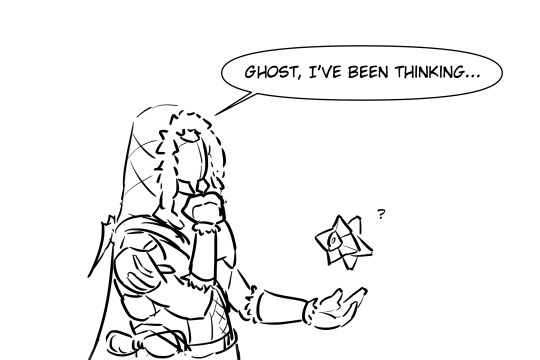
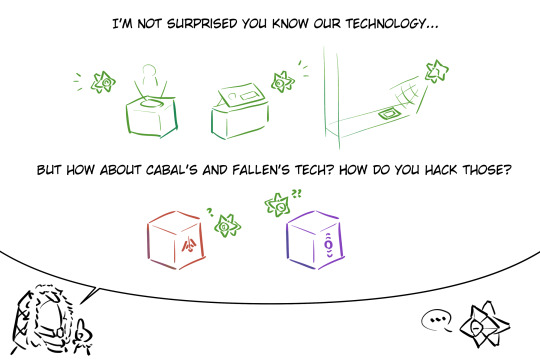
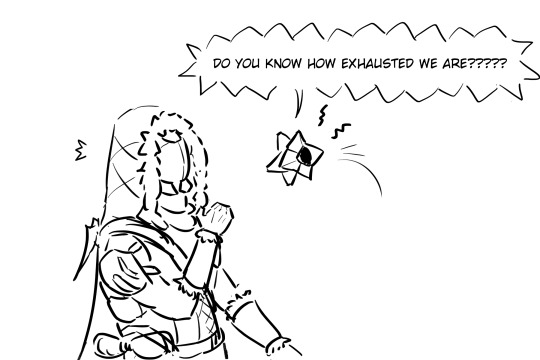
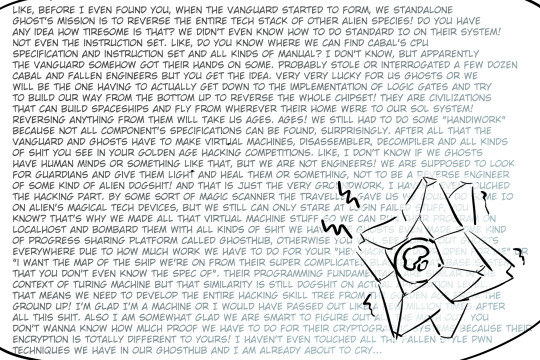
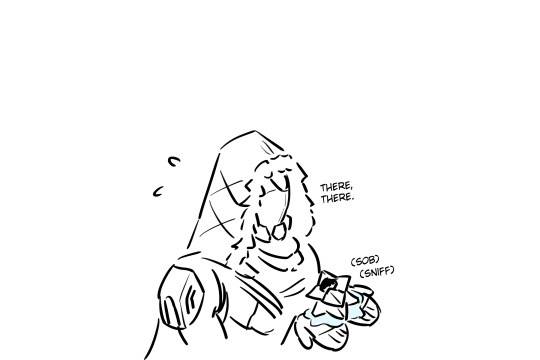
#i don't wanna spend too much time on this#(wrote an essay about how i thought vanguard hacking kit was developed)#yep that's not lorem ipsum#i just wanna see ghost complaining don't judge me too much#i didn't take history class in the ishtar collective (TM) those are all ooc don't actually read into that#if you actually know what im saying then you'd know i probably failed my computer security lesson#also the traveller probably gave them similar tech so their physical architecture should be similar#also ur a nerd lol#destiny 2#destiny hunter#destiny ghost#destiny 2 art#my art
818 notes
·
View notes
Text
I think that the party's communication issues can be summed up as "man, is it awkward to tell someone that you want to spend the rest of your life with them if you've only know them for a few months? Probably."
#isat#isat spoilers#in stars and time#listen they will kill for each other but also its such a short time???? like??? thats part of the tragedy tbh#like!!! yeah theyll go back to their previous lives bc who in their right minds throw out everything they were doing before for people youv#only known for a few months and it turns out all of them do bc theyre insane for each other but!!!! like!!!! thats still a big ask!!!!!#yeah lets throw out everything we've ever know to be together lets fucking go and then they do in the end!!!! but!!!#thats because theyre all are ride or die to the extreme for each other!!!!!! far more than siffrin thinks anyone will ever be for him!!!!#anyway I have a lot of feelings about the party and just how bonkers (affectionate) they are#yeah no siffrin I too would not expect people to put aside their previous lives especially if its clear they have other plans#'yeah im gonna invite myself over to your house to live here lol' yeah no I would not assume that!!!!!!!#the issue is more that issue doesnt communicate what he really wants because if they do and his family says no then... being together truly#will end so he doesnt ask so they never will get a no so it never has to end (and has his reason to keep going)#this is turning into an essay in the tags but like. God its a wild set of circumstances so#tbh Siffrin not thinking the party wants to travel together is not wild to me neither is family not communicating#them wanting to be together ALL OF THEM wanting it is... unbelivable in these circumstances#but they do bc theyre all insane and ride or die but the extent of which is a mystery to all of them#anyway thats my essay in the tags#just read the no loops fic where the adults minus siffrin all offer to bring bonnie to bambouche and had FEELINGS about it#my posts
229 notes
·
View notes
Text
thinking about time lords and their fucked up little society again and i just realized how devastating the revelation of the drums in the end of time is in relation to the master's character.
because of all the renegade time lords in the universe, i think it's the master who most exemplifies the philosophical outlook that the time lords have towards the rest of the universe. they're stuffy observers, administrators, yes - but this position is one they've decided for themselves because of this concept of supremacy over other life forms. imposed and upheld this idea that other species that lack a time sense are less-than, primitive. and the master buys into this hard.
and i mean... compared to the doctor, the master is good at being a time lord. he buys into these supremacist concepts, this idea that every other species (and especially humans) is practically a meaningless ant in the grand scheme of the universe. takes it to the extreme, yes, but its the same underlying principle. he's a good student (despite whatever chibnall might think) - that one time lord from terror of the autons (identity forever a mystery) (its brax) even says "he did receive a higher degree of cosmic science than you." the master could play their game if he wanted to. he's remarkably comfortable with being on gallifrey/the idea of gallifrey(in eot/tlotl) than the doctor ever is. where the doctor avoids the subject of the lord presidency like the plague, the master is like "well if you kill the president you ARE the president! and then you have all of gallifrey!" and when the doctor destroys gallifrey (nominally), the master tries to rebuild it in the sound of drums/last of the time lords. tries to emulate their society. honor them in his little fucked up way. he brings them back from the time war!
and what does he get for it? how did the time lords treat him in response?
they decide to implant the sound of drums in his head, stretching back until he's a child. puts this insufferable noise, this splitting headache, in his head for his entire life. all so that they may live while he dies. because he is diseased, because of them. he has swallowed the pill, bought their propaganda, he has followed the rules, he tried to rebuild them he tried. and in response he is chewed up and spit out like trash so that rassilon's god complex can survive while the universe crumbles.
how crushing must that be to someone? to have your whole worldview - that you are better, you are chosen, you are special - come crumbling down in a few short moments? to see the revered founder-god of the civilization you have so desperately tried to revive look at you and say "you are diseased," even though he was the one to poison you in the first place?
and as his heart is torn to pieces... when rassilon says "no more," and charges his gauntlet, the master - who has spent countless lives fighting death with his bare hands - does not move.
part of me thinks he does not want to.
#and this is why i think if the master didn't get vacuumed into the time war in eot he would have had a mid-mid-mid-life crisis#and then probably just traveled with the doctor to do some gay soul searching#you gotta hold on to something when your entire worldview just got smashed to pieces. might as well be your sad wet cat of a boyfriend#he burns down a small village one day and ten is like finally... nature is healing...#i have an essay due uhhh negative a week ago but this thought grabbed my brain and would not let go#simm!master#the master#doctor who#dw#time lords#tensimm#<- mentioned in tags#may be lowkey incomprehensible i wrote this at one am
954 notes
·
View notes
Text
This is something I thought of suddenly: So when the Actors-on-Actors roster came out, I didn’t have that much of a problem with Taylor being paired up with Joey King. It was kinda odd to have two close friends who are now doing very different projects put together, but they were happy and watching Joey King fangirl over RWRB was fun.
But now that I think of it, it was such a missed opportunity not to put Taylor with Jonathan Bailey.
(Gonna preface this by saying I know far less about Mr Bailey than Tay, I skimmed through Fellow Travelers, Bridgerton S2 is on my to-watch list, and as a fan of Wicked the Musical I have complicated feelings about the movie adaptation)
The thing that is so often brought up with RWRB is that it’s a queer rom-com, it’s a queer love story with a happy ending. The relationship itself does not need to be sacrificed. In fact the whole Kensington confrontation is proving exactly that: they are in a position and point in time where they don’t have to give up on their love and relationship for the sake of other aspects of their lives, they can “find a way to love each other on our own terms, no one else’s”. Many people, including the core four of the movie (Matthew, Casey, Taylor, Nick) have said that this is something that made this movie stand out from other queer productions, something that the world needs.

Fellow Travellers is almost the exact opposite: it is exactly about the periodic queer struggles. It is about the lavender scare when any queer members of the US government were deemed national security risks, and were subsequently dismissed from their stations. It is about the AIDS epidemic that led to the devastation and discrimination of queer communities. It is about a closeted man who chooses to submit himself to a lavender marriage, but who also can’t let go of his one true love. If RWRB is the idealistic future that we’re trying to build, then fellow travellers depict the dirty, gritting, tragic reality of the past.

And here’s the thing, as Matthew said, both types of queer stories are important, both kinds of queer stories need to be told. We need to acknowledge the bad parts of the past, as a reflection of society, as a reminder of history and the progress made, but we also need to imagine the wonders of a better future, as a target for society, as a vision for the progress to make.
And it would have been so interesting to hear the conversation on this contrast between the main leads of two very different queer projects.
Additionally, another thing they can compare is queer intimacy on screen, because again, the intimacy of the two projects are vastly different: RWRB made a deliberate point in creating a more gentle, vulnerable, and quiet intimacy in the Paris scene, with the focus being on the characters’ face; Fellow Travellers’ intimacy is far more explicit and wild, much sexier if you will. Again, both have their place in media and the queer community: sex can be wild and fun, but sex can also be sacred and soft. It would be really interesting to hear the similarities and differences between the two experiences, especially since Taylor has done more explicit stuff in Minx (in a heterosexual on-screen couple) and Jonathan has done more vulnerable intimacy in Bridgerton (also in a heterosexual on-screen couple)




There are just so many parallels and points that the two could have talked about! So although I’m still fairly okay satisfied with the Taylor Actors on Actors we got, this is such a missed opportunity to talk about the importance of different types of stories in the queer community.
#rwrb#red white and royal blue#rwrb movie#taylor zakhar perez#alex claremont diaz#henry fox mountchristen windsor#henry hanover stuart fox#firstprince#fellow travelers#hawktim#hawk fuller#tim laughlin#meraki essay#jonathan bailey#i wanna preface this with a quick disclaimer: i am a rwrb fan#and i dont want to offend anyone from either fandom that is not my intent#but if something i wrote hits wrong please do let me know#lgbtq#also yeah i tried with the gifs#not the best but please bear with it
115 notes
·
View notes
Text
Hilichurls and "Tribal" Portrayals.
While we're talking about Natlan, I also want to mention how awful it is that a section of the fandom tried to make us all out to be crazy years ago for pointing out how racist the portrayal of the Hilichurls are.
Quick content warning for mentions of slavery, colonization, genocide, and anti-Indigenous racism. (Image description is in alt text)
Hoyo used Indigenous people as references for these in-game enemies, which we literally have video proof of, provided by the company itself (Timestamp: 1:30).
The Hilichurls were constantly belittled by Teyvat's people, with an Inazuma npc likening them to demons. I remember Paimon acting like the items they collected were meaningless or pieces of junk during the earlier parts of the game.
They become a lot more sympathetic later due to their actual origins in-game (which I'm sure @phoenix-creates can confirm for me because I know you're farther ahead in Genshin than I am right now), sure, but I always found it strange that Hoyo used Indigenous cultures to portray these "monsters" who have lost their sense of selves (meanwhile their human forms are white), as if to imply that Indigenous cultures are more "wild" or "savage."
Genshin fans of color, since 2020, have pointed out the racist undertones that Teyvat's people were perpetuating against the Hilichurls due to them acting the same way that racists irl act towards non-White cultures, but they were told that they were overreacting and this was swept under the rug as a result. The very next year, it's brought up again with more people finding out about it, and we were still being told that we're overreacting.
So now that we're at Natlan, is it seriously that hard to believe that Hoyo straight up just doesn't respect Indigenous cultures? Black (and many brown) cultures too, because it's very telling that Iansan, the Natlan character with the darkest skin so far, is given a more stereotypically "tribal" look on her design with a bunch of bones used as her accessories despite that not being what her actual inspiration looks like.


(Artist for picture on the right: vieirapx on Instagram)
Sucrose has confirmed in her "Something to Share" voiceline that she collects Hilichurl bones, which is similar to colonizers taking the bones of dead Indigenous people with this added context.
Also, please read or reread the Teyvat Travel Guide Vol. 1. Alice basically confirms that she wants to enslave the Hilichurls for labor and also feed the weaker ones to the stronger ones.
That latter point is cannibalism. I know that many people are fans of Alice, but a lot of what she talks about in the first guide is why I don't like her.
Yes, it can be argued that Indigenous cultures are not the only inspiration for the Hilichurls, as it's been said that they may take inspiration from goblins, Bokoblins from the Zelda franchise, and the Amanojuku from Japanese mythology. Answer me this question, though.
Why is Hoyo capable of referencing a creature and not a human being when it comes to the Japanese inspiration for the Hilichurls, but this does not apply to the Indigenous references? It's dehumanizing, and it feels like another double-standard that needs to be addressed.
Hoyo has casually made black and brown cultures in Genshin appear to be less civilized and more "tribal" compared to our White and East Asian peers, both with the human characters and the non-human ones. Sumeru's quests and enemy npcs had multiple examples of this, with the Traveler and Jeht even destroying almost the entire Tanit tribe with the narrative justification being that, conveniently, most or all of them were selfish, bloodthirsty, and manipulative (Jeht's profile on the wiki page goes into what happened with more depth). They had to die because the tribe was dangerous - even though the main problem seems to be Babel - and Jeht's white, blonde companion needed to help save everyone from these evil, power-hungry savages.
(Sidenote: I think this is the second time overall that Hoyo has come up with an excuse to justify Traveler committing genocide on an entire group of people, with the first being the Iwakura Clan.)
I'm sure that the same thing is going to happen with Natlan's quests and npcs because Hoyo has always been weird about the portrayal of black and brown-inspired characters. The question is not whether any of the creatures or humans from specific groups are bad, suspicious, or designed to fit a specific image. We know the answer to that. The real question is why they are portrayed like this, and why it keeps happening more commonly to the black and brown cast members compared to our lighter peers.
#genshin impact#genshin#hilichurl#natlan#sumeru#iansan#sucrose#alice genshin impact#jeht#traveler genshin impact#boycott hoyoverse#boycotthyv#fix natlan#stereotypes#also if you think about it#what hoyo did with vanessa in the manga is kind of hypocritical#they can't pat themselves on the back over a slave liberation story and portray the lawrences as wrong#but then proceed to pull all their stunts with sumeru and natlan#like honestly what even was the point of the mondstadt plot in the first place if it's ok to disrespect brown people everywhere else#and if you haven't already#look up barnabas from the manga as well#that is a non-pale swana-designed sumeru native who is made to look so comically evil and inhuman that it's painful#gold's essays
120 notes
·
View notes
Text
come watch my new video essay...
youtube
it's about the 2018 german time travel murder mystery show DARK and the limitations of the streaming model of television
it premieres in an hour. you should be there.
153 notes
·
View notes
Text
Death's Garden contributor: Erika Mailman
I met Erika Mailman for the first time when she and I read at SFinSF, a local series that interviews authors, then lets them read a taste of their work. Erika read from her historical murder thriller, The Murderer’s Maid: A Lizzie Borden Novel. She’s since gone on to write amazing travel articles, recounting her adventures. Her piece for Death’s Garden Revisited was about visiting the Picpus…
#cemetery essays#Deaths Garden#Deaths Garden Revisited#Erika Mailman#Lizzie Borden#Paris cemeteries#travel#travel essay
0 notes
Text
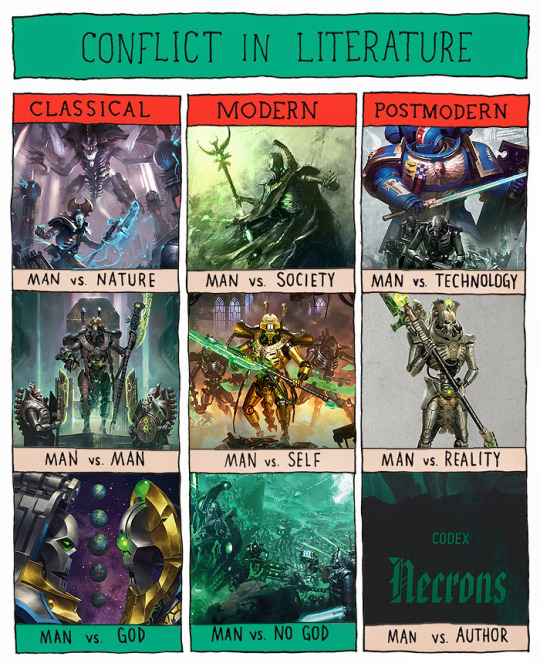
Conflict in Literature + Necron Books
(Read more for titles and notes, watch out for spoilers)
Man vs. Nature - Devourer This is not the only necron vs. tyranid lit, but I thought the cover illustrated the conflict best. Out of all the horribad things in WH40K, the tyranids tend to be presented as the closest faction to a natural disaster; certainly in Devourer they do not logically justify their presence, nor can they be reasoned with, not by the Blood Angels or Anrakyr or the Tomb World he's trying to wake. Not mindless, but an amoral happenstance, like nature itself.
Man vs. Society - The Lords of Borsis Necron court intrigue played straight, with a sprinkle of delusion on the side. Since this story revolves entirely around the schemings and plottings of necron(tyr) society, with changes in dynastic hierarchy as the final objective, it fits best here.
Man vs. Technology - Indomitus This is an awkward placement, since Indomitus was not, well... a compelling story, with most of its tropes not being explored beyond their first introduction. But it is the most bare-bones way of describing this book's premise. Humans battling a robotic malignancy, albeit with a Bolivian Army Ending, which doesn't conclude the plot in either direction 😞
Man vs. Man - The Twice-Dead King: Ruin Ruin is an exceptionally deep novel, and fits every conflict listed here. It was the hardest one to place, because it's not so much choosing the one that goes best, rather crossing off every other conflict not central to the story. Both gods and the absence-of-gods are a problem in Ruin, as well as nature and technology, but they're not at the heart of Oltyx's problem. Society could be a big one, since Oltyx is an exile - but he’s not trying to antagonize his society throughout Ruin, he's trying to work with it, or at least save it from doom. Self and reality both count, but fit better with other stories in the Nate Crowley corpus. So man vs. man it is. His most important clashes are all with individuals ('man') - Djoseras, Unnas, Hemiun, arguably Yenekh in reserve - and by the end, his crownworld is overrun by the Imperium, who will become the antagonists for the second part of his tale. Man vs. 'Man', with a capital M.
Man vs. Self - The Twice-Dead King: Reign Again, this could have gone elsewhere. In man vs. reality, perhaps, or the god-related ones. But the self is where the conflict of Reign truly lies, since Oltyx's greatest obstacle is himself, and it is his inability to accept that which brings his dynasty close to destruction. Thank goodness he got over that one.
Man vs. Reality - Severed The emotional and philosophical core of this novella relies on it. Zahndrekh's inability to see the world as it is brings about the whole plot, and is at the centre of all of Obyron's musings. Interestingly, reality does not win at the end, at least not what necrons envision reality to be: a place of cold hard facts, with no room for emotion. Zahndrekh would rather dream the impossible dream, which might be the healthier way to deal with their situation.
Man vs. God - The Infinite and the Divine 🚨 𝔻𝕆 ℕ𝕆𝕋 𝔹𝔼 𝔻𝔼ℂ𝔼𝕀𝕍𝔼𝔻 🚨
Man vs. No God - Crusade: Pariah Nexus Not a novel, not 100% about necrons, not even out yet as of now (Dec 2023). This is an inherently problematic conflict for WH40K, because gods are very real and very present in that universe... here I'm only thinking about the necron perspective, and the civil war unfolding in their lore. They banded together in a shared purpose eons ago, destroying the Old Ones who oppressed them, and sundering the star gods who subjected them to biotransference. Now they are as antigod as they could be, and they did not retain their bonds, they have once again turned on each other. So it goes.
Man vs. Author - Codex: Necrons (10th Ed.) (Collector's Ed.) James Workshop knows what they did. 😑
#warhammer 40k#wh40k#trazyn the infinite#orikan the diviner#the infinite and the divine#essay#oltyx#the twice dead king#anrakyr the traveller#devourer#the lords of borsis#indomitus#nemesor zahndrekh#vargard obyron#severed#pariah nexus#codex: necrons#necron#necrons#conflict in literature
318 notes
·
View notes
Text
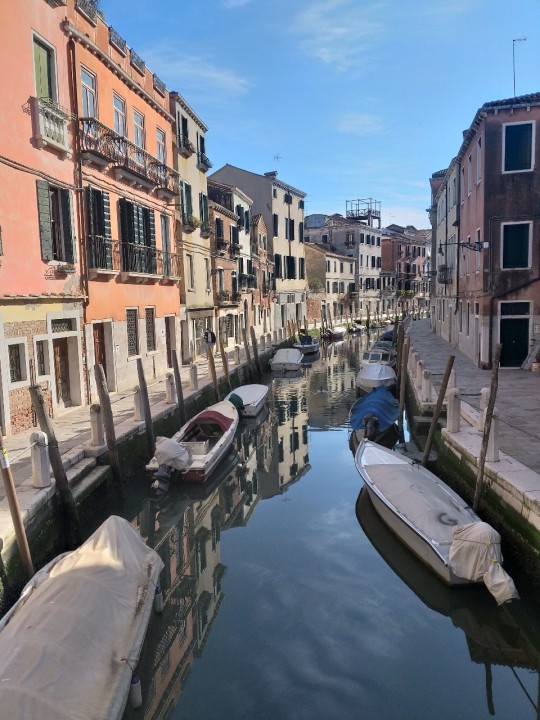
there is so much stubborn hope in the human heart.
// albert camus, the myth of sisyphus and other essays
#photography#ph#venice#venezia#italy#travel photography#italia#art#q#quote#albert camus#hope#the myth of sisyphus and other essays#words#writing#europe#real life#travel#photo#poetry#artist#nature#beauty#architecture#view
187 notes
·
View notes
Text

Travel Essay
A travel essay is a diverse genre; it is both travel notes, sketches, and the author’s travel diary.
Therefore, in its structure, a travel essay is similar to diary entries: the events are described sequentially, as the author gets acquainted with them.
In addition to the fact that the travel essay allows the reader to get acquainted with real events and people, as well as to see what is happening through the eyes of the author, the essay contains the author’s analysis of what he saw and learned.
The author of the travel essay is faced with the task of holistically recreating a picture of reality. Most often, a travel essay reflects a rather long time process.
The travel essay, apart from its literary form, is actively used in advertising journalism and on television (television travel journalism). Most travel programs are written in the form of a travel essay.
1 note
·
View note
Link
I slept under the overpass that night, and in the morning, I wrote a review: “Reasonably good bridge. A little loud for sleeping.” I gave it four stars. After I set off on my bike, I couldn’t stop thinking about it. Because of Google Reviews — because multiple people took the time to review this squat bridge in the middle of nowhere — I felt like I was part of some shared human experience, the newest member of an obscure club. Maybe the other reviewers would disagree, but this moment felt powerful, like seeing other people’s names etched into a park bench or finding yourself deeply moved by the graffiti inside a public bathroom stall. But it was also weird: This tool for consumer reviews had become a digital guestbook for anything and everything in the world.
After that experience at Puente Las Bramonas, I started looking for reviews everywhere. Three stars for an 18th-century governor’s mansion in New Jersey (“very clean old and haunted,” Brianna Baker wrote). Two stars for a shop selling natural handcrafted products in Prince Edward Island (apparently they sell too much tea tree oil, which is toxic to dogs). Four stars for the Environmental Protection Agency office in Chicago (“great time,” writes Ryan Shippen). Hospitals and government agencies are frequent targets, with Google Reviews serving as a form of protest against frustrating systems far bigger than ourselves. On the outskirts of Chicago, unhappy truckers have dragged the rating for a railyard dock down to 2.7 stars, giving insight into an unhappy drama of delayed and misplaced shipping containers and exasperated big rig operators.
The overwhelming crush of reviews — everything rated, every opinion commodified and digitized, every small subplot in life available for critique — borders on farcical.
What happens when you can rate the world around you on a five-star scale? We’re ringing in the new year with Will McCarthy’s wonderful essay on the strange, communal experience of Google Reviews.
1K notes
·
View notes